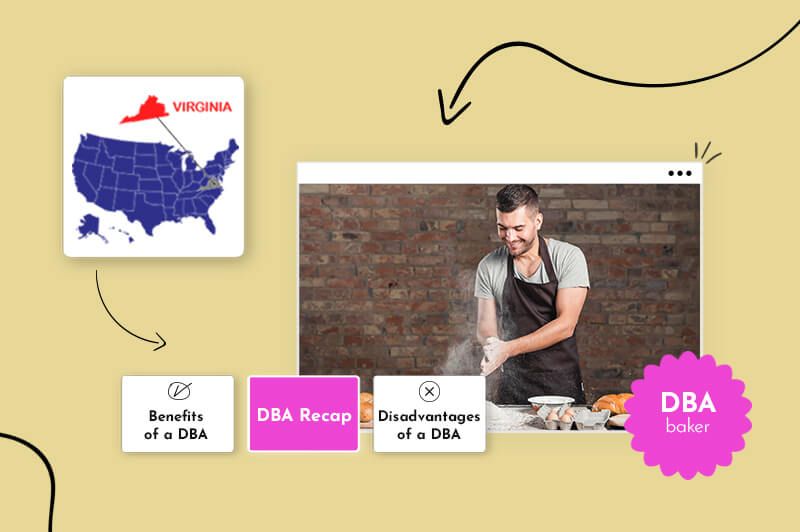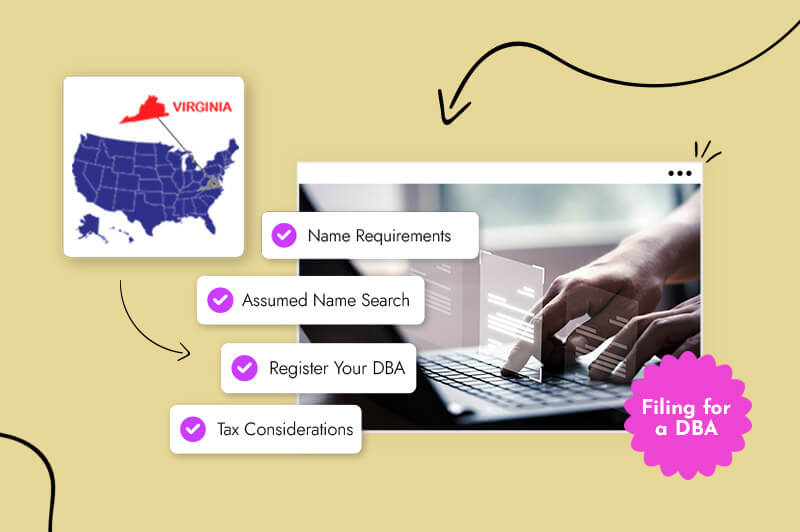When starting a business, choosing a name is one of the most important steps. Your business name can identify your products or services, help your business gain public recognition, and allow you to build brand loyalty with customers. If you’re learning how to start an LLC in Virginia, one of the first steps is choosing a name for your business entity. If you will be doing business as a sole proprietor, you must use your own name for official business purposes. Virginia law allows you to operate your business under a fictitious name (also called assumed name), known as a DBA (“doing business as”).
You can use a DBA whether you operate your business as a sole proprietor or through a formal business entity. The Virginia State Corporation Commission (SCC) uses the term “fictitious name” instead of “DBA,” but they are the same concept. This article provides an overview of how you can obtain a DBA, how much it costs, and why it is important.
What is a DBA?

A DBA is a trading name that you can use once you have registered it with the state of Virginia. Any type of business, from a sole proprietor to a large corporation, may obtain a DBA.
Benefits of a DBA
DBAs can have a variety of benefits for different kinds of businesses. If you are a sole proprietor, a DBA enables you to use a business name instead of your legal name. It provides one benefit of business registration without all of the obligations that come with maintaining a business entity. You can choose a name that describes your business, your location, or some other feature that you would like the emphasize for customers.
A sole proprietor can protect their privacy by using a DBA. It keeps your name out of the limelight and helps you keep your business and personal assets separate. For example, you can open a new bank account in the DBA’s name for business income and expenses.
A DBA may allow you to run a business without obtaining an employer identification number (EIN) from the IRS. Sole proprietorships and single-member LLCs do not need an EIN as long as they do not have any employees.
If you are operating your business through a formal business entity, you can use a DBA for a particular brand, product line, or service. Suppose you operate a business that provides multiple distinct kinds of service. You can register DBAs for each service to help customers distinguish among them.
Disadvantages of a DBA
A DBA does not grant any sort of liability protection. Unlike a corporation or LLC, a DBA is not a business entity. It merely allows you to operate a business under a fictitious name other than your own name or your company’s name.
DBAs also do not offer any tax benefits. The IRS and Virginia will tax your business the same whether you use a DBA or not.
Registering a DBA does not provide any specific intellectual property protection for a brand name or trade name. You can obtain that kind of protection by registering for a trademark with the state or the U.S. Patent and Trademark Office.
Is having a DBA in Virginia a must?
Virginia does not require businesses to obtain or use a DBA. It is completely optional. Whether you should get a DBA depends on your business strategy. As discussed above, a DBA can benefit a sole proprietor by providing privacy and making it easier to avoid commingling personal and business assets.
Businesses that have registered as a business entity might want to use DBAs to identify different goods or services or target different regions or markets. A business that operates multiple franchises can use DBAs for each franchise. Suppose, for example, that a business has franchise agreements with two national fast-food chains, one that serves hamburgers and one that serves fried chicken. The business could obtain DBAs for each franchise to use at those locations.
While you are not required to use a DBA in Virginia, you must follow certain procedures if you do choose to use one. The consequences for failing to do so are addressed further below.
Filing for a DBA in Virginia

Getting a DBA for your business in Virginia requires several steps, beginning with finding a name.
Name requirements
Virginia sets multiple requirements for business entities, but few for DBAs. A DBA does not have to be unique, nor does it need to have a designator like “LLC” or “Inc.”
Proceed with caution if you want to use a DBA that is identical or very similar to a trademarked name. The state will not stop you from registering the name. The SCC takes the position that it cannot decide who has the right to use a particular name. The trademark owner could have something to say, however, once you start using it.
Begin with Virginia assumed name search
You can conduct a Virginia LLC name search on the SCC’s website to make sure it is not already taken.
Register your Virginia DBA
You can register your DBA with the SCC through their website, or by mail. Online registration will get a faster response.
File online
Filing online requires you to create an account with the Clerk’s Information System (CIS) on the SCC website. There is no fee for setting up an account.
Once you have created your account and logged in, click the “Online Services” tab at the top left of the screen to reveal a drop-down menu. Choose Name Reservations/Registrations/Fictitious Name. Two more drop-down menus follow after this. Choose “Fictitious Name,” then “Fictitious Name Certificate,” and then click “Continue.”
The next step asks you whether your DBA will be associated with an entity that is already registered with the SCC. If you are registering a DBA for an LLC or other business entity formed in Virginia, you can search for the entity to complete this step. If not, you may click “No” to proceed.
Now you are ready to enter information about your DBA. The system will ask for:
- The fictitious name or DBA
- The name of the business entity associated with the DBA, if any
- Whether you are signing as a sole proprietor or on behalf of a business entity
- Signature information
Finally, you can pay the $10 filing fee by credit card or eCheck and complete the registration.
File by mail
If you prefer to file by mail, you must download one of the following forms from the SCC website:
- Form SCC59.1-70-IN if you are a sole proprietor; or
- Form SCC59.1-70-BE if you are filing on behalf of a business entity
The individual form asks for:
- Your name
- The DBA
- Your business address
The business entity form asks for the same information, except that it asks for the name of the business entity that will be using the DBA. It also asks for:
- The type of business entity
- The jurisdiction in which it is organized
- The ID number issued by the SCC, if any, or the principal business address
The filing fee is $10. You may pay with a check payable to the State Corporation Commission. The mailing address is State Corporation Commission, Clerk’s Office, P.O. Box 1197, Richmond, VA 23218-1197. If you use a courier service, you can send the paperwork to 1300 E. Main Street, 1st Floor, Richmond, VA 23219.
The SCC will send you a Fictitious Name receipt once they have completed the filing process. You can request a certified copy of the receipt online through the CIS portal for an additional $6 fee.
Consequences for operating with a DBA without registration
Virginia law prohibits any individual or business from using a DBA without first registering it with the SCC. A violation of this requirement is a misdemeanor offense, punishable by a fine of up to $2,500, a jail sentence of up to one year, or some combination thereof.
Tax considerations
A DBA in Virginia has no tax benefits. It also has no tax disadvantages. Your business will have the same tax treatment that it would have without a DBA.
Conclusion
A DBA offers benefits for sole proprietors and business entities in certain circumstances. It offers privacy, and it can help a business identify its product or service. It is not the same as registering to create a business entity, though, so it will not grant any sort of liability protection to sole proprietors. Whether or not you should register a DBA will depend on how you plan on running your business.
